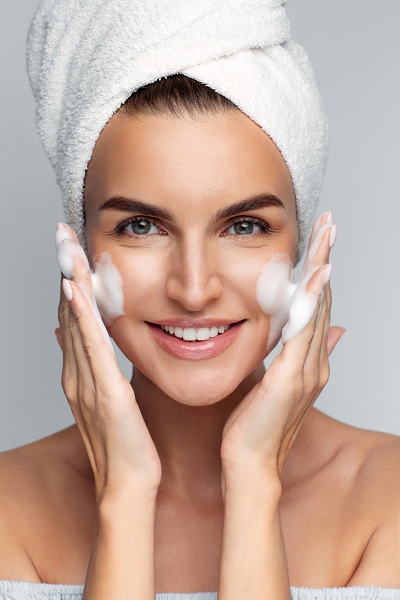It’s no secret that regular exfoliation is key to maintaining a healthy appearance. For most people, this means using either a physical exfoliant, such as scrubs, or a chemical exfoliant, such as glycolic acid and other hydroxy acids.
However, there’s a third player in the exfoliation game that’s quickly making a name for itself – enzyme exfoliants. Read on for our complete guide on what they are, how they work, and whether or not your skin would benefit from using one.
Contents
What is an Enzyme Exfoliant?
Although enzymes are technically chemicals, they’re also natural biological molecules that work in a different way from chemical exfoliants, which is why they’re placed in a class of their own.
The enzymes used for exfoliating are usually derived from fruits – you’ll learn more about specific fruit enzymes later on.
How Do Enzyme Exfoliants Work?

Enzyme exfoliants contain proteolytic enzymes. This basically means that they’re able to break down proteins.
One of these is the keratin protein, which keeps old and rough skin cells attached to the surface of the skin.
Breaking this protein down allows the skin to easily shed those dead cells.
What makes an enzyme exfoliant different from the other chemical exfoliants out there? Well, whether you’re talking about glycolic acid, lactic acid, mandelic acid, or anything else, enzymes don’t work quite as quickly, but are just as powerful in the long run.
This makes them significantly more gentle on the skin, meaning that they’re ideal for those with sensitive skin types.
The Benefits of Exfoliating with Enzymes
There are numerous skincare benefits to be experienced when exfoliating with enzymes, with some of the main perks being:
- Increased skin cell turnover
- A balanced and even skin tone
- Dark spots and discoloration fade away
- A smooth and soft skin texture
- Dull skin is brightened and appears more radiant
- Pores appear smaller and more refined
- Fine lines and wrinkles are less visible
- Sebum production is regulated, which helps with oily skin
- Can be used on both the face and the body
The Best Enzymes for Removing Dead Skin Cells
While all fruits contain enzymes, there are some that are far better than others at exfoliating the skin.
Carica papaya fruit extract, which contains an enzyme called papain, is one of the most popular. Studies have found papain to be a better exfoliant than lactic acid [1].
However, pineapple enzymes, also known as bromelain, and pumpkin enzymes are also very effective.
Keep an eye out for citrus grandis (grapefruit) extract too – this is another rich source of exfoliating enzymes.
How to Use an Enzyme Exfoliant

Whether you go for an enzymatic scrub or a chemical enzyme formula, the application method will depend on the specific product you’re using.
That said, it’ll usually involve you applying the product to your cheeks, forehead, neck, and body, before massaging it into your damp skin for a couple of minutes.
You’ll then be able to rinse away your dead skin cells to reveal a bright and fresh complexion. As with any type of exfoliation, always follow up with either a serum, a face mask, or a moisturizer.
Related: see our list of the Best Face Moisturizers.
Are Enzyme Exfoliants Safe?
Enzymes can usually be used to exfoliate every skin type without causing irritation. However, if you have particularly sensitive skin, it would still be worth performing a patch test before using an enzymatic exfoliant for the first time.
It’s also worth noting that enzymes are known for being challenging to keep stable. Oxygen, pH, temperature, light, and more can affect the efficacy of exfoliating enzymes, which is why cosmetic chemists need to be extremely careful when formulating them into skincare products.
You’ll often find enzymes mixed with stabilizing ingredients, such as xanthan gum.
Once you’ve purchased an enzyme exfoliant, keep it safe in a cool, dark, and dry location. Whether it may be a scrub, a solution, an exfoliating mask, or anything else, this will help to prolong its shelf life.

FAQs
Do enzymes exfoliate?
Yes, certain enzymes are very effective at exfoliating the skin.
Do enzyme exfoliants work in the same way as salicylic acid?
Although enzyme exfoliants dissolve dead skin cells in the same way that salicylic acid does, they’re much gentler and don’t penetrate quite as deeply into the skin.
Can enzyme exfoliants be used on sensitive skin?
Yes, most enzyme exfoliants can be used on sensitive skin without any problems.
Summary
If you’ve been looking for a new way to exfoliate, it would definitely be worth trying an enzyme exfoliant. From oil and acne reduction to anti-aging to skin brightening, fruit-derived enzymes offer the same benefits as other exfoliants, yet without any of the harsh side effects.
References
[1] https://iopscience.iop.org/article/10.1088/1755-1315/614/1/012171/pdf